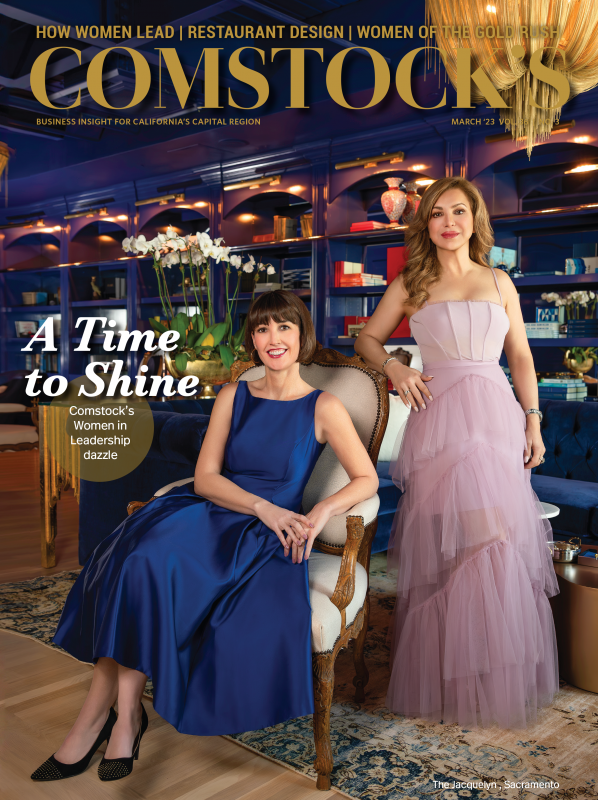When I think of these words in today’s world — “A secretary is not a toy. No, my boy, not a toy” — it makes me shudder! But maybe the words will make more sense as you read on.
When Frank Loesser wrote those lyrics for the Broadway and movie hit “How to Succeed in Business Without Really Trying,” the words were meant as a parody, as was the entire Pulitzer Prize-winning show. The song’s early 1960s message was only starting to resonate: that secretaries needed to be taken seriously as working professionals.
You’re now reading Comstock’s annual Women in Leadership issue. I’m as proud of this issue as I am of the women featured in it. It leads me to reflect on how different the world was for women when I was young. Back then, there were three things an ambitious young woman could aspire to become: a nurse, a school teacher or a secretary. Underlying these choices was the presumption that during her tenure in any of those jobs, she’d achieve the “ultimate” goal of becoming someone’s wife.
To say “We’ve come a long way, baby” is to greatly underestimate the progress American women have made in the private, public and education sectors. We’re no longer the workplace coffee-fetchers often depicted in movies. As this issue of Comstock’s makes clear, women are everywhere today and doing everything.
I knew exactly what I wanted to be ever since the fifth grade. My sister became the teacher. I wanted to be a secretary — the very best secretary in the country! (Yes, I always had very high ambitions). And it turns out, I really was good at it. My typing and shorthand speeds were off the chart — and even better, accurate. Oh, if only I’d known of competitions back then. The work was great and fun, requiring discipline, attention to detail and one of our society’s fading skills: listening.
My secretarial jobs took me from working for the general manager of an irrigation district to the State of California Department of Social Welfare; from a real estate office to the region’s then-largest law firm. And, finally, to the California Legislature, where I started in the typing pool and worked my way up to the office of the Speaker of the House. All were great jobs!
After years of secretarial work, I surprised myself by finding my niche in media sales, work that ultimately led to my founding and publishing my own namesake magazine. Comstock’s turns 35 in July.
It’s interesting that women today still hold only a small percentage of the CEO roles in the United States — about 10.4 percent of Fortune 500 companies. But their numbers are increasing. There are countless careers women never even dreamed of holding but do hold today. They include everything from astronaut, politician, attorney, soldier, chauffeur and school administrator, to psychologist, biomed technician, news reporter or anchor, blacksmith, occupational therapist and human resources director. If the list sounds like a hodgepodge, it should. I use it to indicate that women can aspire to any job they want, as long as they prepare for it.
So what’s the Next Thing? I’m seeing many women leading the charge to create start-up companies — yes, female entrepreneurs. Comstock’s has written about several of them in this region, but we’re seeing this throughout the country. A problem has been in getting these women-owned startups funded. That may be because independent investors, accelerators, angel investors and venture capitalists seem likelier to fund male-dominated companies (just an observation). The “next thing” could be women-led investment funds being created around the country for the sole purpose of supporting women-led startups.
I attended such a gathering just a few days ago — a brand new innovation called the Minerva Fund. It’s led by a small team of women, one of whom is a Comstock’s Women in Leadership honoree, Rachel Zillner (read about her in this issue). The fund has researched and is looking to fund several female-led startups, and their goal is to get other women to invest in the fund to expand its impact even further. It sounds really good — potentially risky but really good. I have to think that other such funds are being developed around the country. One of the great things women do, and we’re known for it, is helping other women succeed. I say, here’s to “what’s next.”
Yes, we have come a long way. Let’s keep a good thing going.
Winnie Comstock-Carlson
President and Publisher
–
Stay up to date on business in the Capital Region: Subscribe to the Comstock’s newsletter today.
Recommended For You

Is Education’s Future Safe — or Artificial?
Comstock’s president and publisher Winnie Comstock-Carlson weighs in on the future of education with AI.

A Time for Inspiration
Why do we so often abandon our New Year’s resolutions? Comstock’s president and publisher Winnie Comstock-Carlson wishes readers a Happy New Year while contemplating the comparative power of inspiration.

Fondly Remembering the Good Ol’ Days
It was the age of the milkman, the gas attendant and free paper bags. Comstock’s president and publisher reminisces about a simpler time before all the automation.

What Does Real Prison Reform Look Like?
Comstock’s president and publisher argues the benefits of inmate education programs.

The Wage of Innocence?
Comstock’s president and publisher reflects on minimum wage and the value of work.

Successful Entrepreneurs Are Innovative Risk-Takers
Comstock’s president and publisher considers the risks involved in becoming a successful small-business entrepreneur — such as starting a magazine with just $2.50 in your pocket.





